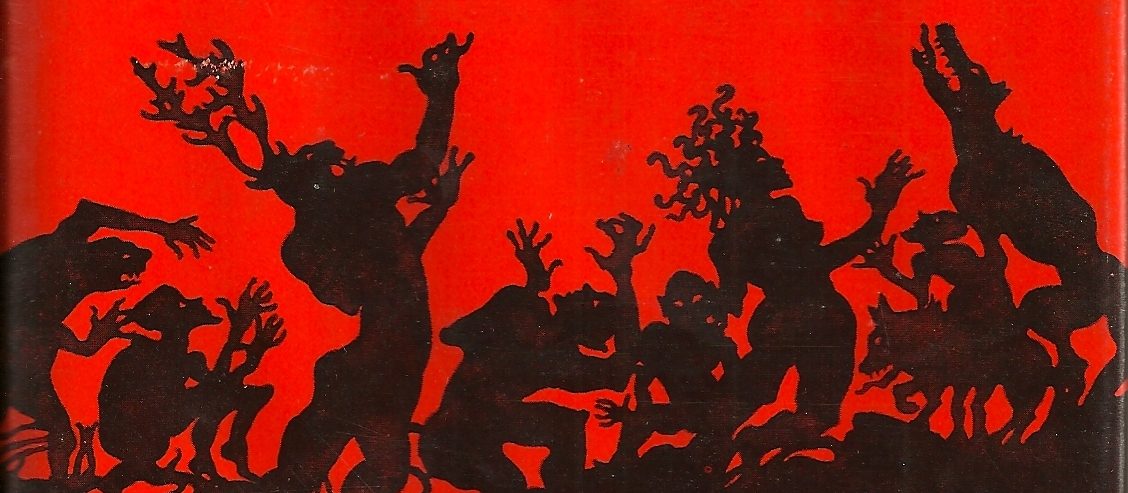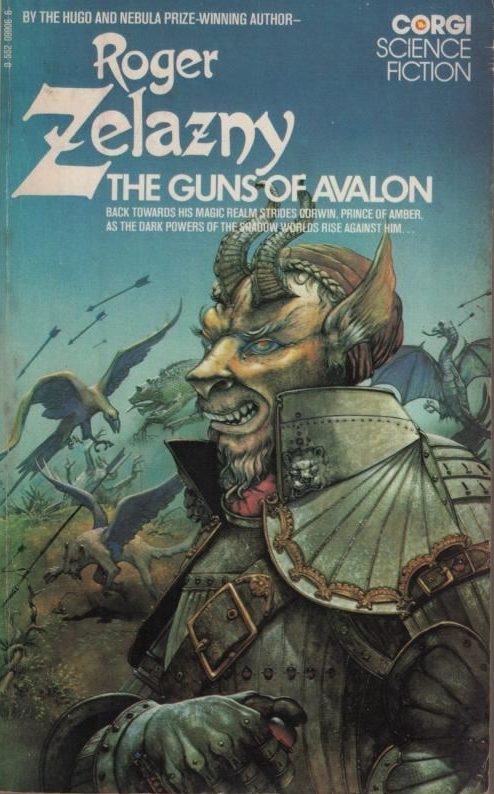

“In the mirrors of the many judgements, my hands are the color of blood. I am a part of the evil that exists in the world and in Shadow. I sometimes fancy myself an evil which exists to oppose other evils.”
Roger Zelazny’s The Guns of Avalon, the second volume of The Chronicles of Amber, makes small improvements on the first book, Nine Princes in Amber, but is still sorely lacking in many areas. Light plotting, a (still) largely undeveloped magic system, and tasteless writing leave little of value for the reader to latch onto.
In the world of The Chronicles of Amber, the universe consists of an infinite number of Shadow worlds, and these alternate realities cover the spectrum of possibilities. The Princes of Amber, of which our protagonist Corwin is one (which he learned in Nine Princes in Amber after awakening in a hospital with amnesia), are essentially the gods of the shadow worlds—immortal, superhuman strength, can use magic, vast amounts of knowledge, tactically brilliant, etc.
The novel picks up right where the first ended, with Corwin seeking to dethrone his recently coronated brother Eric as the King of Amber. The plot of The Guns of Avalon is very haphazard, though, with Corwin jumping around different Shadow worlds doing random quests that pop up out of nowhere like sidequests in an Elder Scrolls game. E.g. You have found a wounded traveler on the side of the road. Help him get back to his village.1 That is how the main storyline starts—Corwin is not on the way to anywhere, and just happens to come across a knight who needs saving from some cats out of hell, which have been let into the world by Corwin’s curse upon his brother Eric.
Corwin takes Lancelot to a place called Lorraine, where he meets a man he had once banished named Ganelon, one of the only decent characters in the book but whose presence is mostly trivial. He also falls in love with a camp follower named Lorraine (yes, the girl’s name is the same as the town) that I suppose is meant to show a side of Corwin that contrasts with his militaristic tendencies; but Corwin’s love interests so far have been less developed than James Bond’s, which is saying something. The closest we come to a well-developed romantic interest is Dara, who would technically be Corwin’s great-grand-niece—which is weird enough, but (luckily?) she turns out to be an imposter and is actually some goat-horned demon who wants to destroy Amber.
After thousands of years, Corwin has finally discovered a substance that functions as gunpowder in Amber, where the real substance is inert. He travels to what is portrayed as our world, and procures hundreds of thousands of dollars worth of the stuff so that he can gun down Eric’s troops. But he ultimately must use his army to save Amber from an outside threat, an enemy which does Corwin’s job for him—Eric dies at the hands of another, and Corwin takes the throne.
The novel lacks believable character motivations, and relies much too heavily on things happening by chance. Some of the characters are interesting, but pop up in odd situations, and none of them ever seem even slightly disconcerted by the calamity that is happening around them. The magic system is still malleable to the point of preposterousness. For example, out of nowhere, Corwin is able to see the future. Ganelon, who was banished from one Shadow world into another much like the first, is suddenly capable of negotiating an arms deal in Switzerland, posing as a German tourist, and commanding an army of mercenaries.
Zelazny’s writing is again suspect. He has a tendency to neither show nor tell, but merely to list things in the order they happened, as well as to conveniently mention things only as they are needed for the plot (i.e. he makes it up as he goes along). On the very first page, Corwin pulls his sword out of a hollowed out tree.
Now I had to find me a place, a place resembling another place—one which no longer existed. I located the path. I took it.
After a time, I stopped at a hollow tree that had to be there. I reached inside and drew forth my silvered blade and strapped it to my waist. It mattered not that it had been somewhere in Amber. It was here now, for the wood that I walked was in Shadow.
I continued for several hours, the unseen sun somewhere behind my left shoulder. Then I rested awhile, then moved on.
Later, he decides that the sword should have been given a name, but instead of editing the section when he first retrieved his sword, he does this:
I took it [a practice sword] into my hands. It was shorter and a lot heavier than Grayswandir. (That is the name of my blade, which I know I have not mentioned up until now. It is a story in itself, and I may or may not go into it before you learn what brought me to this final pass. But should you hear me refer to it by name again, you will know what I am talking about.)
Despite these flaws, Zelazny does come up with a few nice lines; unfortunately, combing for them became the sole reason to continue reading.
[Our father] tolerated us, I feel, as occasionally inevitable consequences of passion.
While I had often said that I wanted to die in bed, what I really meant was that in my old age I wanted to be stepped on by an elephant while making love.
Just like the first book, The Guns of Avalon can seem like a decent novel in summary form. It’s a neat enough premise, but so far the series has provided only a shallow frame for a story; there is little of substance as of yet, and we’re two books in. Given that I bought the omnibus edition (which contains all ten novels), I may continue, but so far I find little to recommend in this series that is held in such high esteem by the sci-fi/fantasy community.
1. That’s not an actual quote from the book, but the traveler is Sir Lancelot, so I think my incredulity is justified.
What a laughable review. We are all dumber for having read it. Guns is a masterwork.